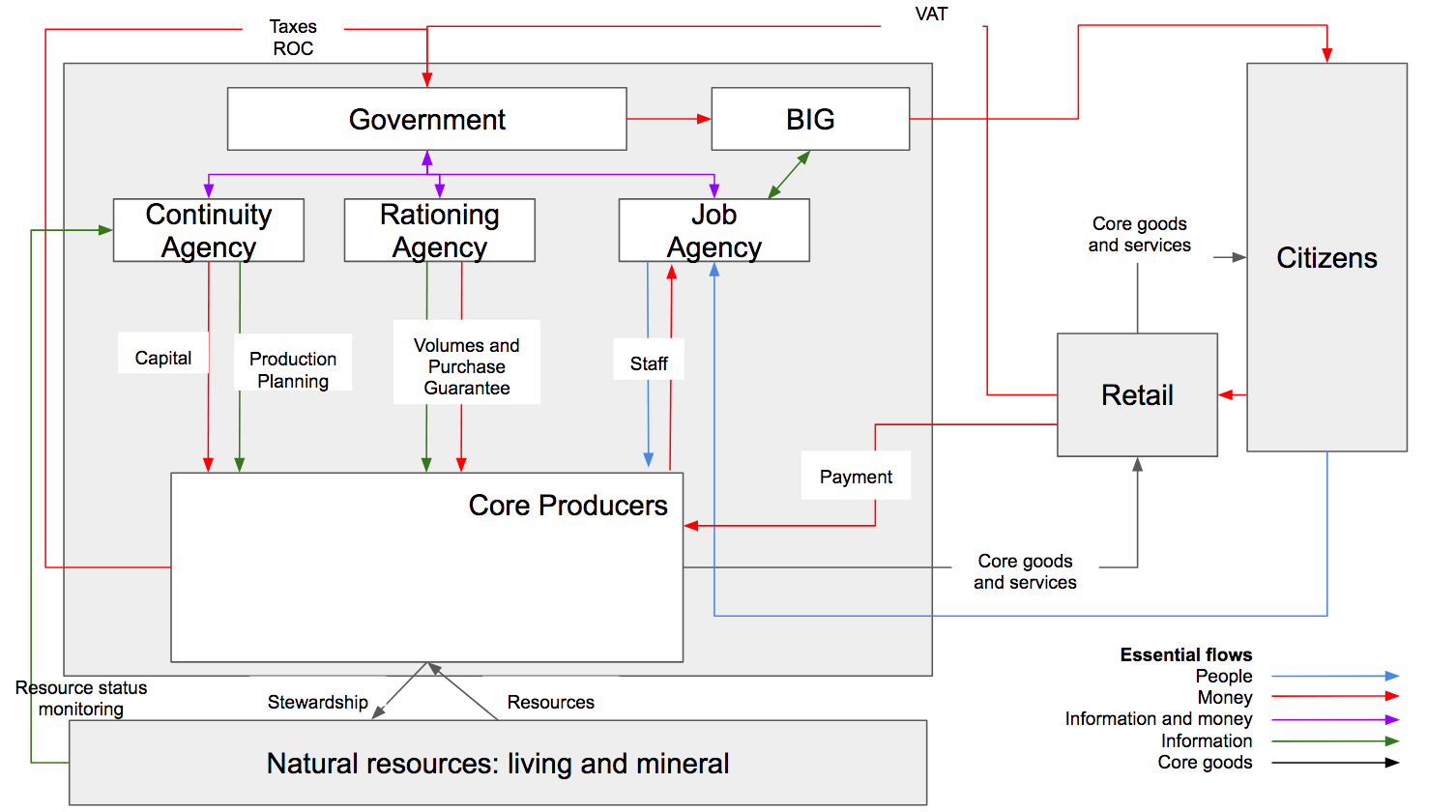Can we reorganise the way we run things and create a stable core of the economy that will see us through a crisis at least with the very basics and help us out of the other side? This article presents a solution — hoping that it will spark a discussion.

The current crisis has illustrated the disconnect between the way we organise production via private-owned producers on one hand and the need for basic services and employment on the other. It has also highlighted an important role for the nation-state: a duty of care to all living in the nation.
It only takes a drop in demand for companies to begin laying off workers, starting a downturn spiral where those laid off have no money to buy from the companies still operating. And a lack of components — from a virus stricken-supplier — can be enough to stop production, halt sales and again the company lands in trouble.
Private-run companies may function well in times of economic stability, but under crisis they experience internal stress and are unable to provide the goods needed. Indeed, they are unable to offer jobs, which are the cornerstone of the modern society.
To ensure continuity under crises and times of economic depression core functionality is needed. This proposal is for a “nearest possible” solution that modifies elements of the current economy to introduce a higher level of core stability.
Note that only the core of the economy is covered by this proposal — other parts of the economy can continue or be addressed by other solutions
The essential elements are represented in the diagram above. What is new is:
- A Basic Income Guarantee (BIG) that is given to citizens without work and who are working under the Job agency.
- A Job Agency that employs all citizens otherwise not gainfully employed. The job Agency places them with core producers or hires them out to other producers or even charities, local authorities etc.
- A Rationing Agency that works to keep prices stable and prevent profiteering. The rationing agency works on volumes of essential services and goods and provides a volume guarantee. That is to say it pays for unsold product.
- A Continuity Agency that works in various forms of Private-Public-CItizen Partnership to provide capital and staff to core producers. If core producers cannot pay staff then their wages are covered by the BIG.
The continuity agency is also responsible for the stewardship of key mineral and living material resources, including stewardship responsibilities as part of continuity agreements.
What is present in most economies today is:
- Government: with a duty of care to see the economy functions and citizens receive care
- Core producers: these cover government-run organisations like the health service, Cooperatives as well as privately-owned corporations, including banks. Core producers includes foundations and charities.
- Retail. Distribution of goods to citizens and the source of VAT
- Citizens, in this proposal they are all enrolled in the Government Job Agency if not otherwise employed.
Starting from the top, the Government funds the Basic Income Guarantee which goes to citizens. These purchase goods from Core Producers and participate in the Job Agency.
Core producers in turn get capital (If needed) from the Continuity Agency, as well as planning support. The Rationing Agency provides volumes and purchase guarantee. The Job Agency provides staff — at zero cost if necessary.
The Rationing Agency makes sure volumes are available, that citizens can only buy certain amounts of them and that no-one profiteers by setting a fixed price.
If core producers can pay staff, this money goes back to government to pay the BIG and volume guarantees.
How it works
The Job Agency together with the Continuity Agency ensure that there is always capacity in the nation to provide basic needs. At the same time citizens are always offered positions with organisations, even with charities so they are able to feel they are contributing to society.
The BIG ensures people can pay for the basics.
The Rationing Agency ensures there is enough for all at prices that work for all.
Core producers are protected by the continuity agency and rationing volumes as well as the possibility to get sufficient and free staff. The continuity agency will on the other hand ensure that for the removal of risk the organisation will have restricted capital outflow in terms of dividends.
The Continuity Agency ensures that natural resources are available for core production and that the living environment is regenerated to allow further provision for future generations.
The Sustainable Development Goals call for an end to hunger, homelessness and joblessness. This is a beginning. Let us have that dialogue.
About the author: Stephen Hinton is a sustainability consultant, currently working on regional approaches to the circular economy. He has held positions as CEO of a water purifiction company and board member of a cooperative bank. Find him at stephenhinton.org

Leave a Reply